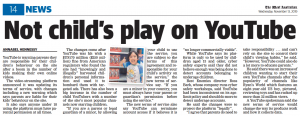Annabel Hennessy – The West Australian
Teenage boys are more likely to be recorded by police as sexual assault offenders than males in any other age group, according to a new report.
And more than one in three of those convicted of sexual assault charges in Australia are not being jailed for their crimes.
It comes amidst growing concern about the influence the easy access to online pornography is having on young people with primary schools now being forced to deal with children attempting to copy sexual material they have viewed online.
The report on sexual assault from the Australian Institute of Health and Welfare, which is set to be released today, found that teenage boys aged 15-19 had the highest offender rates of any male age group — with 102.9 cases per 100,000 in 2018-19.
For men aged 35-44 there were less than 70 cases per 100,000.
For men aged 55-64 and 65 and over there were fewer still with less than 50 cases per 100,000 in each of these categories.
Men were also the offenders in 97 per cent of sexual assault cases recorded by police.
While teenage girls aged 15-19 were also most likely to be the victim of sexual assaults.
And females across all age groups were seven times more likely to be victims than men.
Of those aged over 15 and found guilty of sexual assault, 57 per cent received a custodial sentence in a correctional institution. This means 43 per cent avoided jail, instead receiving a custodial sentences that were served in the community, a suspended sentence or a non-custodial order.
‘Victims can experience physical injury, but also many other, ongoing effects, such as fear, anxiety, and changes to their sleep, diet and social routines, as well as their ability to work,’ said AIHW spokeswoman Louise York.
The shocking statistics come after a report from the Federal Government Social Policy and Legal Affairs Committee, released earlier this year, found there was “widespread and genuine concern” about online pornography and its “serious impacts on the welfare of children and young people”.
Best Enemies co-founder Ross Bark, whose company runs cyber safety workshops in Australian schools, said teachers were dealing with cases where kids as young as 12 were emulating sexual acts they had seen online at school.
Mr Bark said while there was now more attempts to teach young people about consent, too many children were still getting their sexual education online.
“They’re easily able to get access to material online that they shouldn’t get access to and its normalising dangerous behaviours,” Mr Bark said.
“With sexual abuse there can be a misconception that when a younger kid assaults another kid it is somehow less harmful than other predatory situations but it has long term consequences.”
Collective Shout campaign manager Caitlin Roper, whose organisation campaigns against the sexualisation of girls, said porn was having a significant impact on both the attitudes and the sexual practices of young people.
“Mainstream porn fails to promote safe sex, consent, respect or mutual pleasure. It depicts men as sexually dominant and entitled to use women in any way they see fit. Mainstream porn depicts women as sexual objects who never say no, and who enjoy painful and degrading sex acts,” she said.
If you or someone you know has been a victim of sexual abuse, there is support available. Call 1800 RESPECT, the national sexual assault and domestic family violence counselling service.




